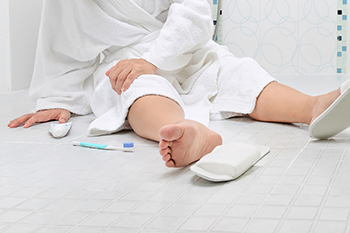Ways Seniors Can Prevent Falling

Preventing a fall is paramount for seniors, and luckily experts can recommend a number of ways to do just that. Fall-proofing the home environment is first on the list. Start by decluttering floors and narrow hallways, and choose chairs that are stable. Avoid sitting on low chairs, sofas, folding chairs, and chairs on wheels that may affect your balance. Install nightlights in hallways and lamps beside your bed, as well as adding grab bars in tub and shower areas. Remove throw rugs or loose carpeting. Other fall prevention tips include wearing shoes with non-skid soles, avoiding loose clothing that may get caught on something, and going barefoot or wearing just socks when walking in the house. Further, it’s a good idea to review medications for side-effects, such as dizziness or drowsiness, that may contribute to a fall. Having eyeglasses prescriptions updated is recommended. If you have neuropathy, arthritis, or any other foot and ankle conditions that affect your stability when standing or walking, please visit a podiatrist for information on walking aids or devices that may help.
Preventing falls among the elderly is very important. If you are older and have fallen or fear that you are prone to falling, consult with one of our podiatrists from Westside Podiatry Center, LLP. Our doctors will assess your condition and provide you with quality advice and care.
Every 11 seconds, an elderly American is being treated in an emergency room for a fall related injury. Falls are the leading cause of head and hip injuries for those 65 and older. Due to decreases in strength, balance, senses, and lack of awareness, elderly persons are very susceptible to falling. Thankfully, there are a number of things older persons can do to prevent falls.
How to Prevent Falls
Some effective methods that older persons can do to prevent falls include:
- Enrolling in strength and balance exercise program to increase balance and strength
- Periodically having your sight and hearing checked
- Discuss any medications you have with a doctor to see if it increases the risk of falling
- Clearing the house of falling hazards and installing devices like grab bars and railings
- Utilizing a walker or cane
- Wearing shoes that provide good support and cushioning
- Talking to family members about falling and increasing awareness
Falling can be a traumatic and embarrassing experience for elderly persons; this can make them less willing to leave the house, and less willing to talk to someone about their fears of falling. Doing such things, however, will increase the likelihood of tripping or losing one’s balance. Knowing the causes of falling and how to prevent them is the best way to mitigate the risk of serious injury.
If you have any questions, please feel free to contact one of our offices located in Liverpool, Camillus, Skaneateles, Oswego, and Cicero, NY . We offer the newest diagnostic and treatment technologies for all your foot care needs.
